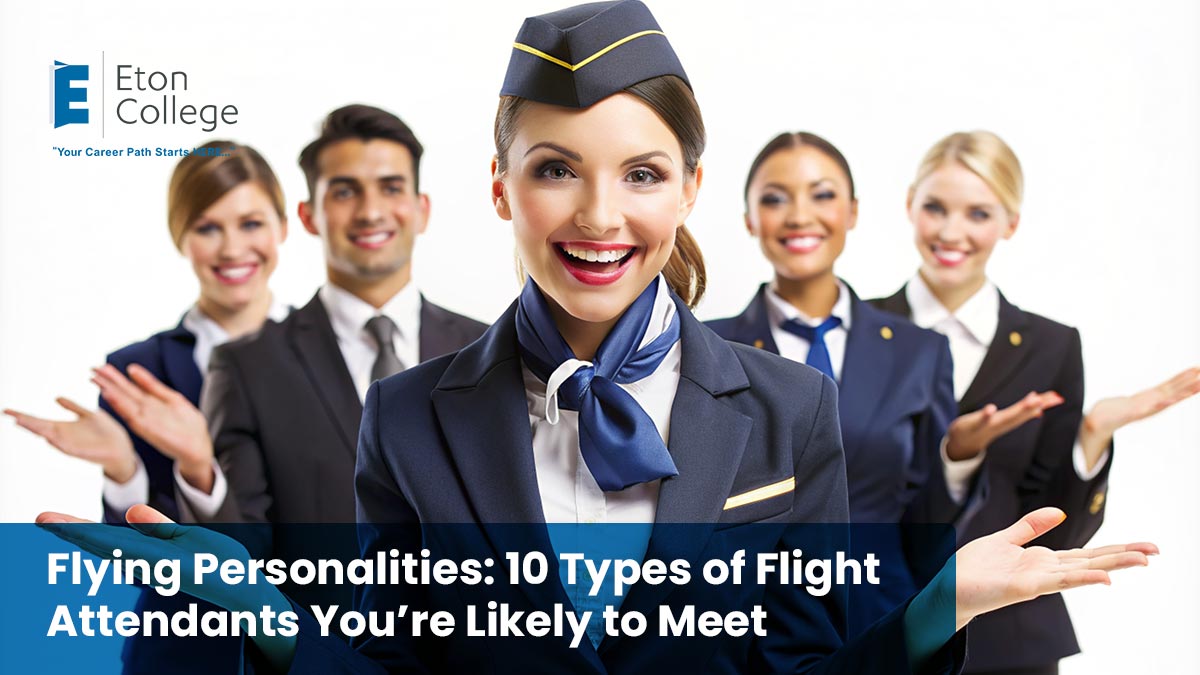- Aspiring flight attendants can choose from a variety of roles in the aviation industry, each with distinct responsibilities.
- Specializations like International Flight Attendant, Corporate Flight Attendant, and Special Assistance Flight Attendant offer diverse career paths.
- Eton College provides comprehensive flight attendant training programs to prepare students for these dynamic roles.
- Understanding different types of flight attendants helps students make informed career choices.
- Each type of flight attendant plays a key role in enhancing the travel experience and maintaining safety standards.
Flight attendants are much more than just smiling faces serving meals and beverages on flights. Behind their calm demeanor is a rigorous set of responsibilities, from ensuring the safety of passengers to providing exceptional customer service. But did you know that there are different types of flight attendants, each with unique roles in the aviation industry? In this blog, we explore 10 different types of flight attendants you’re likely to meet during your travels and how these roles contribute to a smooth and enjoyable flying experience.
1. Commercial Airline Flight Attendant
This is the most well-known type of flight attendant. Commercial airline flight attendants are responsible for passenger safety and comfort on domestic and international flights. They handle pre-flight briefings, demonstrate safety procedures, and provide food and beverage service throughout the flight. These attendants are skilled at managing a variety of in-flight situations, ensuring compliance with aviation regulations, and offering excellent customer service to passengers.
2. International Flight Crew Member
Flying across borders brings additional responsibilities. These crew members not only provide in-flight services but also manage customs and immigration procedures. Fluency in multiple languages is often necessary to communicate with passengers from diverse backgrounds. These professionals are experienced in handling the unique challenges of international travel, from cultural differences to extended flight durations.
3. Corporate or Executive Crew Member
Working on private jets, these attendants cater to high-net-worth individuals, business executives, and dignitaries. Their role requires a high level of discretion, attention to detail, and the ability to provide bespoke services tailored to each client’s preferences. In addition to safety duties, they manage premium in-flight amenities and collaborate with ground staff to ensure a seamless travel experience for elite passengers.
4. Lead or Purser Cabin Crew
A Lead or Purser takes on a supervisory role, overseeing the cabin crew during the flight. They coordinate in-flight services, act as the liaison between the cabin and the flight deck, and resolve escalated passenger issues. Their leadership ensures smooth operations, and they are responsible for handling administrative tasks, such as submitting reports on flight incidents.
5. Special Assistance Crew Member
These attendants are trained to support passengers with disabilities, unaccompanied minors, or those requiring extra care. They use specialized equipment and ensure that passengers with special needs have a safe and comfortable journey. Patience, compassion, and problem-solving skills are essential for this role.
6. Language-Specific Flight Crew (Mandarin/Russian/Japanese)
For flights requiring specific language skills, airlines employ crew members fluent in languages such as Mandarin, Russian, or Japanese. These professionals assist with communications, make announcements, and provide interpretation, ensuring passengers and crew have smooth interactions despite language barriers.
7. Jet Aviation Crew Member
In this niche role, crew members work on private jets or chartered flights. They offer personalized services to a smaller group of passengers, often catering to the needs of high-end clientele. Adaptability and attention to luxury details are key aspects of their responsibilities.
8. Check Cabin Crew
Check crew members ensure that airline personnel adhere to safety and service standards. They evaluate crew performance during flights, offer feedback, and make sure that all procedures are followed correctly. This role requires a deep understanding of airline regulations.
9. Airline Cabin Crew
Airline crew members work for commercial airlines, handling scheduled passenger flights. They perform standard duties like safety briefings, food and beverage service, and ensuring passenger comfort.
10. Avion Express Cabin Crew
Avion Express Cabin Crew members cater to charter flights, often organized by travel agencies. They are trained to meet the unique needs of passengers based on the specific routes and destinations they serve.
The Benefits of Flight Attendant Training
Training is one of the most crucial aspects of preparing for a career in the aviation industry. Through this intensive program, individuals develop the skills needed to manage emergencies, provide medical assistance, and ensure passenger safety. Beyond the technical knowledge, the training equips future crew members with essential soft skills, such as communication, leadership, and conflict resolution. These competencies are not only valuable in aviation but can also be applied across various industries, making those in the role highly adaptable professionals.
Additionally, training enables flight crew members to handle high-pressure situations effectively, enhancing their ability to manage everything from passenger discomfort to unexpected turbulence. With the confidence gained through rigorous preparation, individuals are ready for dynamic roles with ample growth opportunities.
Expanding Career Opportunities
The aviation industry is ever-evolving, creating new and exciting career paths for those in the field. While many may associate this profession solely with in-flight service, the range of experiences and skills gained opens doors to leadership roles, training positions, recruitment, and operations management.
As professionals gain experience, many choose to advance within the industry. Some take on leadership roles or focus on areas like luxury or private aviation, where the demand for tailored services is on the rise. Others may explore opportunities beyond aviation, as their skills in customer service, communication, and problem-solving are highly transferable to sectors like hospitality, tourism, and business management.
Common Misconceptions
There’s a widespread belief that those working in the skies are simply there to serve food and drinks, but their responsibilities go far beyond this. One common misconception is that the role is an easy, glamorous job focused on travel and sightseeing. In reality, the primary duty is to ensure passenger safety. From pre-flight checks to managing emergencies mid-air, their role demands a high level of professionalism and expertise.
Another myth is that this career is mainly part-time or limited to short flights. In fact, many professionals work long hours, particularly on international routes, often spending several days away from home. Continuous training is essential to stay updated with safety regulations and procedures, further proving that this is a skilled, demanding profession critical to aviation operations.
Soaring into the Future
Whether you’re dreaming of working on international flights, delivering exceptional service to passengers across the globe, or tailoring luxury experiences for elite travelers on private jets, the world of aviation offers a vast array of exciting opportunities. The profession of a flight attendant goes beyond just ensuring safety and comfort—it’s about shaping memorable travel experiences, creating connections with people from different cultures, and managing the unique challenges that come with every flight.
Each role within the industry, from international travel to corporate jet services, plays an integral part in upholding the standards of aviation, ensuring that every passenger has a safe, comfortable, and enjoyable journey. These professionals are the heart of in-flight service, and their responsibilities help to ensure the success of airlines worldwide.
For those considering this dynamic career, Eton College offers specialized training programs that equip future flight attendants with the knowledge and skills needed to thrive in any role they choose. Whether you see yourself in a commercial airline or private aviation, Eton College prepares you to take on the skies with confidence, professionalism, and a passion for excellence. Start your journey today and unlock the possibilities that await in the ever-expanding world of aviation.




